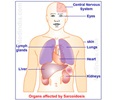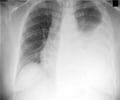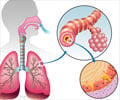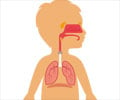Common Cold
What we call the common cold is actually a set of symptoms of upper respiratory infection caused by a wide range of infectious viruses. Symptoms include watery nasal discharge, sneezing, stuffiness, sore throat, fatigue, muscle aches and headache, and - occasionally - fever.
If the doctor suspects a cold, he will look out for inflamed nasal lining, a swollen turbinate, clear mucus or a red throat. In any case, call him if your fever fails to subside in 48 to 72 hours or if it exceeds 102 degrees F.

Because of the large number of viruses that can cause viral rhinitis, it is impossible for the body to develop immunity against a cold. The body may become immune to a particular virus. However, another one may come along producing the same symptoms. That is also the reason why no preventive vaccine has been developed for the common cold.
Colds do not arise because you become chilled or wet. The viruses that cause colds pass from person to person, usually through body contact with nasal secretions or because viruses come into contact with nasal secretions or branes. A cold usually takes 7 to 10 days to subside.
Over the counter decongestant medications and acetaminophen can temporarily reduce the symptoms of a cold. Recent studies suggest that the zinc, taken in the form of lozenges three or four times a day, may help reduce the length of the cold. However, these studies are inconclusive. Prevention, therefore, is the best defence against colds. Except for symptomatic treatments, there is no effective medical therapy for colds.


























